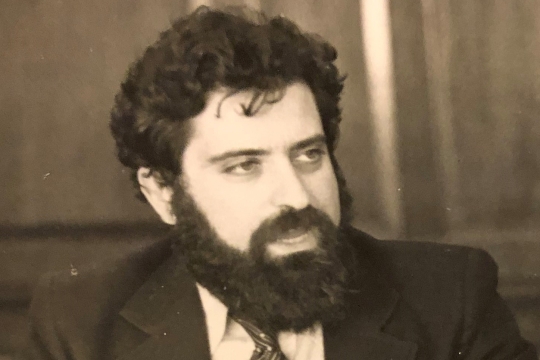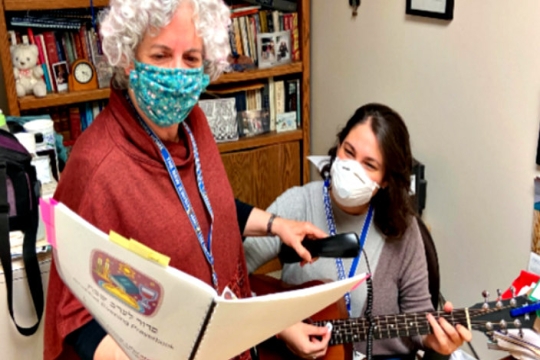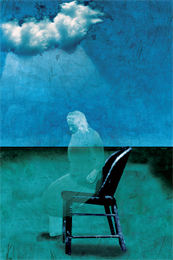Living in this modern age of medical advancements is both a blessing and a curse. While new treatments often enable us to live longer, sometimes those extra years are filled with suffering, both for those afflicted with illness and their family members. Such is the case with Miriam*, a very close member of my family who has Alzheimer's.
I don't get to see Miriam very often because we live far apart. I knew she had been losing some cognitive functions, but during my last visit the changes seemed dramatic. Being with her was challenging and confusing. At times she seemed totally coherent, talking about politics and religion. Then, almost without blinking, she had trouble remembering the answer to the last question she'd asked, even though I had answered it many times. I felt so sad, seeing this once-vibrant, intelligent, and active person becoming someone I no longer recognized.
How much longer, I wondered, would I have with Miriam until she no longer recognized me? I was searching for explanations, for understanding, most of all, as I often do at difficult times, for comfort.
While praying to God for help and solace, it struck me that there may be a different way to think about Alzheimer's. When Miriam's mind seems distant, the "person" I used to know is not really gone, but just gone from me, at those moments.
Where does the "person" go? Jewish rabbinic tradition talks of a soul that is separate from the physical body. As the Midrash tells us, "A person's soul is from heaven and his body from earth" (Sifrei Deut, 306:132a). The sages believed that when a person died, their soul joined God. A funeral reading from the Rabbi's Manual (CCAR, 1988) expresses this same concept: "The dust returns to the earth as it was; the spirit returns to God who gave it." Later Jewish philosophers understood the soul to have three parts: nefesh, ruach, and n'shamah. Nefesh is the part of our soul that enters us when we (and all living creatures) take our first breath. When God created Adam, God breathed into Adam the breath of life, and Adam became a living nefesh. Ruach is the part of the soul that provides us with our survival instincts-the drive to eat, to sleep, and to meet our physical needs. N'shamah is the emotional and intellectual soul, the locus of higher feeling and knowledge that stimulates learning, creating, and forming relationships-the part that makes us "human."
Now, rather than thinking of Miriam as "the person I love whose mind has gone," when Miriam doesn't seem aware of her surroundings, I visualize the n'shamah part of her soul moving from earth to heaven, and, sometimes, back again. Knowing her n'shamah is visiting with God is a source of great comfort to me. When she asks the same question for the tenth time, I no longer react with impatience; I envision her in a holy place.
Now, nefesh and ruach are still with Miriam's body. When she reaches the later stages of Alzheimer's, the ruach will start to leave, making it increasingly difficult to perform the tasks of daily survival. Eventually, only the nefesh, the breath left in the person, is present, until that, too, finally goes to be with God, at death.
How might our liturgy reflect this perspective? The morning blessing, Modeh Ani, reads:
"I offer thanks before You, ever-living Sovereign, that You have returned my soul to me in mercy. How great is Your trust."
It was written at a time when it was believed that while you slept, your soul, n'shamah, left you to be with God, and then returned to you when you awoke. I have adapted the prayer (Mishkan T'filah translation) so it can be recited by loved ones of Alzheimer's patients as a way of expressing and appreciating their moments of clarity.
Recited for a Female
Modah ani l'fanecha,
melech chai v'kayam.
She-hechezarta bah nishmatah b'chemla, rabah emunatecha.Recited for a Male
Modeh ani l'fanecha,
melech chai v'kayam.
She-hechezarta bo nishmato b'chemla, rabah emunatecha.I offer thanks to You,
ever-living Sovereign,
that you have restored their n'shamah to them, with mercy.
How great is Your trust.Miriam, I offer this prayer in your honor.
*Name was changed to preserve anonymity.
Related Posts

Reflecting on 50 Years in Jewish Journalism

"A New Day": A Poem for the Gift of Living


